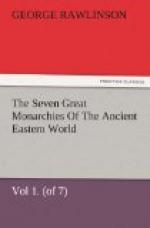It will be impossible to give a complete account of this vast and complicated system. The subject is still but partially worked out by cuneiform scholars; the difficulties in the way of understanding it are great; and in many portions to which special attention has been paid it is strangely perplexing and bewildering. All that will be attempted in the present place is to convey an idea of the general character of the Chaldaean religion, and to give some information with regard to the principal deities.
In the first place, it must be noticed that the religion was to a certain extent astral. The heaven itself, the sun, the moon, and the five planets, have each their representative in the Chaldaean Pantheon among the chief objects of worship. At the same time it is to be observed that the astral element is not universal, but partial; and that, even where it has place, it is but one aspect of the mythology, not by any means its full and complete exposition. The Chaldaean religion even here is far from being mere Sabaeanism—the simple worship of the “host of heaven.” The aether, the sun, the moon, and still more the five planetary gods, are something above and beyond those parts of nature. Like the classical Apollo and Diana, Mars and Venus, they are real persons, with a life and a history, a power and an influence, which no ingenuity can translate into a metaphorical representation of phenomena attaching to the air and to the heavenly bodies. It is doubtful, indeed, whether the gods of this class are really of astronomical origin, and not rather primitive deities, whose character and attributes were, to a great extent, fixed and settled before the notion arose of connecting them with certain parts of nature. Occasionally they seem to represent heroes rather than celestial bodies; and they have all attributes quite distinct from their physical or astronomical character.




